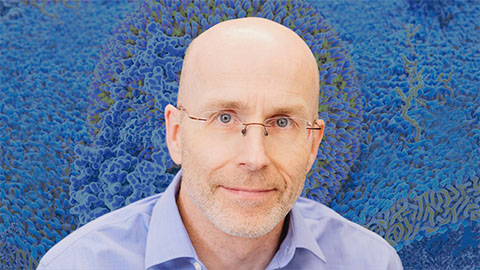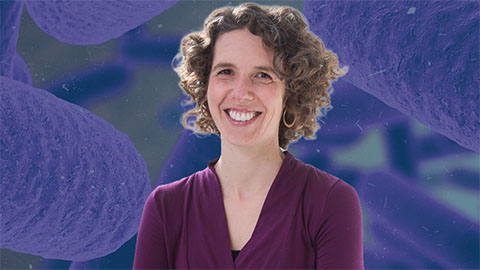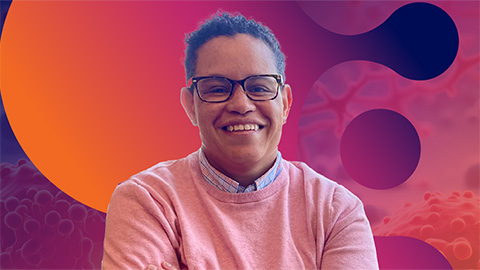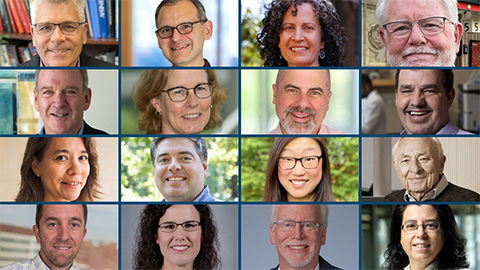2021 voter guide
It's time to cast your ballot in the American Society for Biochemistry and Molecular Biology's elections. Below, we've published the candidates' statements of interest, and you can see more about them and vote here. Voting ends Aug. 6, 2021.
Candidates for president-elect
ASBMB is governed by an elected Council that is led by the president. The elected person serves for one year as president-elect, two years as president and one year as past-president.
Each voter is allowed to select one candidate in this race.
HUDSON FREEZE | Professor and director, Human Genetics Program and Sanford Children’s Health Research Center, Sanford Burnham Prebys Medical Discovery Institute

Statement of interest: I have been a member of the ASBMB for more than 35 years. I believe that from research comes the power to cure. One of my goals is to improve science communication with the public, and the other is to advance collaboration between basic scientists and physicians. Biochemistry and ASBMB can lead that charge. Success for both goals requires mutual respect and fundamental belief in our power to make a difference in the world.
I have over 43 years of continuous National Institutes of Health funding, and my lab has published over 310 papers. Our work identified more than 300 patients and 25 rare congenital disorders of glycosylation (CDG). Over the decades, I’ve interacted with basic scientists, physicians and especially with CDG families and their support groups to bridge science and medicine and foster outreach.
I’m a strong advocate of science communication to the public and taught in the ASBMB’s Art of Science Communication. My motto at FASEB: Go make a difference. It continues at the ASBMB.
Read the full candidate profile.
ANN STOCK | Distinguished professor, Rutgers University–Robert Wood Johnson Medical School, Department of Biochemistry and Molecular Biology

Statement of interest: I have been a member of the ASBMB since joining as a graduate student. I view the society as a collective voice for members of our discipline to define and promote core values and standards of excellence, while also serving as a force to drive change. I applaud the society’s past successes in providing an inclusive community for members, establishing and maintaining the highest standards in scientific publishing, disseminating scientific advances, recognizing achievements of members, promoting best practices in education and training, furthering scientific communication and outreach, and advocating for research and science policy. There is always more to do in these areas, and I believe they should continue to be the foundation of society activities.
In addition, I see opportunities for the ASBMB to broaden initiatives in two areas. One is to increase diversity and equity in the STEM workforce pipeline. Another is to ensure the future sustainability and impact of the society by enhancing recruitment of the next generation of ASBMB members, for whom the society can serve as a hub for developing networks and maintaining connections to the BMB discipline as they embark on an increasingly broad range of bioscience-related careers.
I would welcome the opportunity to work with the dedicated ASBMB committee members and staff to further these initiatives, as well as to support the important efforts to maintain core society values and best serve members as the ASBMB navigates transitions to open access publishing and independent annual meetings.
Candidate for treasurer
The ASBMB Finance Committee assists the Council in fulfilling its financial oversight responsibilities by monitoring the society's financial resources, including: budgeting and financial planning, financial reporting, internal controls and accounting policies, and investment fund strategies. The treasurer leads the committee over a three-year term and can be re-elected or reappointed to serve an additional term.
Each voter is allowed to select one candidate in this race.
JOAN CONAWAY | Professor, vice provost and dean, University of Texas Southwestern Medical Center

Statement of interest: I’ve been an ASBMB member since the late 1980s and have benefited from society activities through regular participation in the ASBMB annual meeting and ASBMB small meetings and conferences and as a reader, author and member of the editorial team of ASBMB journals. In short, the ASBMB has been an important part of my scientific life.
It has been an honor to contribute to the ASBMB as its treasurer since 2019, and I am interested in continuing to serve in that role to work with the Council and staff leadership to keep the society on a firm financial footing so that it can sustain and grow its journals, meetings, educational and professional development, and other programs for many years to come.
Candidates for Council
The ASBMB Council serves as an advisory board to the president and the executive director for setting priorities and strategic directions, overseeing resource allocations, and ensuring that all activities align with the mission of the society. Councilors are elected for three-year terms and can be re-elected or reappointed to serve one additional term.
Each voter is allowed to select two candidates in this race.
KELLY G. TEN HAGEN | Senior investigator and chief, Developmental Glycobiology Section, National Institute of Dental and Craniofacial Research, National Institutes of Health

Statement of interest: I am a senior investigator and chief of the Developmental Glycobiology Section in the intramural program of National Institute of Dental and Craniofacial Research and a member of the ASBMB (since 2006).
My lab has made contributions within the field of protein O-glycosylation that have advanced our understanding of this evolutionarily conserved modification and its role in normal development and organ function.
Beyond my laboratory, I have been a vocal advocate for women and underrepresented groups in science. I serve as the chair of the National Institutes of Health Women Scientists Advisors Committee, which helped to spearhead efforts to address harassment and bullying in the workplace, including the development of policies and procedures for reporting, investigating and adjudicating inappropriate workplace behavior. Additionally, I served on the Advisory Committee to the Director Working Group (Changing the Culture to End Sexual Harassment), which outlined key recommendations to address sexual harassment throughout the biomedical research community and within scientific societies. Most recently, I have been involved in efforts to address racial inequity at the NIH, serving as a member of the UNITE initiative and on the newly formed NIH Anti-Racism Steering Committee.
As a member of ASBMB Council since 2018, I advocated for the formation of the society’s Women in Biochemistry and Molecular Biology Committee (on which I also serve), a group that aims to support and promote women in science. I am committed to equity, diversity and inclusion and feel that scientific societies such as the ASBMB have a huge role to play in fostering inclusive excellence in science.
Moving forward, I will advocate for programs that address barriers limiting the full participation of historically marginalized groups in science. I will also continue to advocate for additional ways ASBMB can support and promote the accomplishments of women and other underrepresented groups at all stages of their careers.
Read the full candidate profile.
AUDREY LAMB | Professor and chair, University of Texas at San Antonio, Chemistry Department

Statement of interest: I have enjoyed my first term serving on Council — it has been an exciting time. We have made the socially responsible move to make the content of our society journals open access, which should result in increased equity in access to scientific results, accelerated discovery in the research community, and increased exposure of society members’ research. We have also responded to the repercussions of the pandemic to our society and its members. I would like to serve a second term to continue this work, and so that I can continue to help do the hard work that will be required as we establish our new normal.
Moving forward, we will need to make decisions that continue to increase inclusion and support a healthy work–life balance. I recently moved my research program from an R1 Association of American Universities institution to an R2 Hispanic-serving institution. I would like the new perspective that comes from my new home environs to be reflected on Council as we make the decisions that could have differential outcomes for underrepresented scientists and society members with increased teaching and service responsibilities.
I am proud of the progress we have made and look forward to being part of the process as we continue to make the ASBMB a model professional society for the future.
Read the full candidate profile.
JAMES NTAMBI | Professor, University of Wisconsin-Madison, Biochemistry Department

Statement of interest: I feel proud to be a member of an international scientific and educational organization that supports an inclusive and diverse membership of students, researchers, educators and industry professionals.
I have served as a member of the ASBMB Council for three years.
I highly value and respect the three peer-reviewed journals: Journal of Biological Chemistry, Journal of Lipid Research, and Molecular & Cellular Proteomics. One of my first papers as a graduate student — which I am still proud of — was in JBC. It was after its publication in 1985 that my Ph.D. mentor, Paul Englund, first introduced me to this society, which I joined 1986 when I was a postdoctoral fellow with Daniel M. Lane. I quickly learned that this society organized successful interactive educational and scientific meetings. I serve as a member of the editorial board of JBC and periodically review papers for JLR.
I was honored when ASBMB recognized me for my educational contribution to the global community when it awarded me its Award for Exemplary Contributions to Education in 2013. I have continued to educate internationally with pride and support for career development and science education at all levels. The ASBMB's consistent support has allowed me to strengthen my affiliation and passion for global health.
Furthermore, the ASBMB Student Chapters is one program that is dear to my heart. It acts as a pipeline to generate future scientists. I have participated several times in the evaluation of ASBMB Undergraduate Poster Competition. I have been part of panels that have organized ASBMB meetings.
The ASBMB continues to help and encourage people to excel at all stages of their scientific careers through networking, professional development, interactive meetings, the now open-access journals and leadership opportunities within and outside the society. I could go on and on.
Read the full candidate profile.
QUINN VEGA | Professor, Montclair State University, Department of Biology

Statement of interest: Although a member of the ASBMB for 25 years, it wasn’t until I became a regional director for the ASBMB Student Chapters that I learned the extent to which the society supports biochemists and molecular biologists. Over the past decade, in helping the Student Chapters build a network of students and educators across the country, I gained a better sense of how the society helps to build collaborations between researchers, helps to train the next generation of scientists and how the society supports science advocacy, both locally and nationally.
I have had the opportunity to meet with faculty, students and industry scientists from across the country, and I have been impressed by their extensive knowledge and by their willingness to be part of a larger scientific community. I believe that, by continuing to build networks across institutions and subdisciplines, the ASBMB can provide even more opportunities for members to connect with other researchers, educators and those interested in science advocacy.
Candidates for Nominating Committee
The ASBMB Nominating Committee nominates regular members of the society to stand for election for President, Council, Publications Committee and the Nominating Committee. Committee members are elected for three-year terms and can be re-elected or reappointed to serve one additional term.
Each voter is allowed to select one candidate in this race.
KELLY CHACÓN | Associate Professor, Reed College, Chemistry Department

Statement of interest: I am thrilled at the opportunity to stand for election for the ASBMB Nominating Committee. The ASBMB has continually pushed for visibility, representation and wellness of minoritized groups in the biochemical sciences while also highlighting our amazing science! As a proud member of the committee, I would be in a position to scout for, promote and amplify diverse voices of our organization and provide opportunities for those folks to become more involved with the society. I am also very active professionally on Twitter and feel strongly that I can use that platform to convey and recruit talented people for the many opportunities for leadership within our organization.
Read the full candidate profile.
KAYUNTA JOHNSON–WINTERS | Associate professor, University of Texas at Arlington, Department of Chemistry and Biochemistry

Statement of interest: I'm seeking this position because I want to contribute to an organization that has not only supported my own growth as a scientist and faculty member but has, more importantly, been very intentional about diversity, equity and inclusion and has shown unwavering support for all, including people of color and the LBGTQ community. Such support through programs, mentorship, outreach and engagement is critical for the future of our profession, and I’d like to bring my experiences and expertise to further assist, and support, the membership of the ASBMB through service on the ASBMB Nominating Committee.
It has been a privilege to be a member of ASBMB Minority Affairs Committee since 2017. This opportunity has been an amazing learning experience and has allowed me to champion issues of DEI in STEM, areas about which I have a deep and abiding passion.
At my home institution, I have served as the director of our Louis Stokes Alliances for Minority Participation program and organizer and faculty adviser of the College of Science Black Graduate Student Association, which provides extensive mentoring for underrepresented and first-generation STEM students. As the Women’s Faculty and Staff Network faculty chair, I have supported the advancement of women across campus and am a key leader in this role. It has been my mission to increase diversity and shed light on issues for faculty, staff and students from diverse backgrounds.
As a member of the ASBMB Nominating Committee, I hope to cast a wider net to attract a broader group of people to the society, while enhancing that sense of belonging for women scientists of all backgrounds. A concurrent goal would be to increase overall membership and participation at annual meetings, while creating career-development workshops for members at all career levels.
I have received much support and have felt such a sense of belonging in the ASBMB community and now want to give back and enable others to receive the same and greater support through my service to the organization.
Enjoy reading ASBMB Today?
Become a member to receive the print edition four times a year and the digital edition monthly.
Learn moreGet the latest from ASBMB Today
Enter your email address, and we’ll send you a weekly email with recent articles, interviews and more.
Latest in People
People highlights or most popular articles

Trainee mentorship as immortality
Suzanne Barbour will receive the ASBMB Sustained Leadership Award at the ASBMB Annual Meeting, March 7-10 in Washington, D.C.

Life in four dimensions: When biology outpaces the brain
Nobel laureate Eric Betzig will discuss his research on information transfer in biology from proteins to organisms at the 2026 ASBMB Annual Meeting.

Fasting, fat and the molecular switches that keep us alive
Nutritional biochemist and JLR AE Sander Kersten has spent decades uncovering how the body adapts to fasting. His discoveries on lipid metabolism and gene regulation reveal how our ancient survival mechanisms may hold keys to modern metabolic health.

McRose awarded Packard fellowship
She will receive $875,000 in research funding over five years.

Redefining excellence to drive equity and innovation
Donita Brady will receive the ASBMB Ruth Kirschstein Award for Maximizing Access in Science at the ASBMB Annual Meeting, March 7–10, just outside of Washington, D.C.

ASBMB names 2026 fellows
The American Society for Biochemistry and Molecular Biology announced that it has named 16 members as 2026 fellows of the society.
